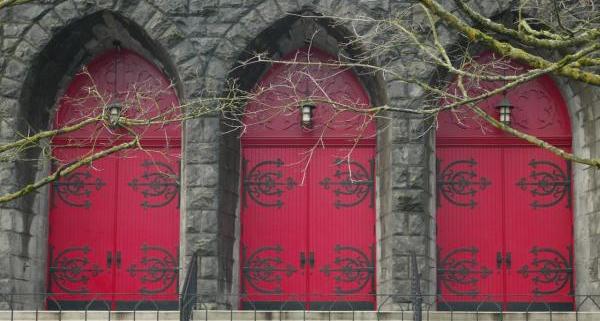What to do about the seminaries?
Theological education faces a steep, uphill battle. Seminaries are scrambling to grab onto whatever share they can of the steadily dwindling traditional market. And some are creatively looking for new markets.
All of them are changing, to some degree or another. Some mixture of hope and anxiety is running through the entire system.
Some are buckling down to ride out the change by reaffirming, or conserving, their traditional theologies. Others are exploring inter-faith discussions or experimenting with how to reach the “nones.”
Some are fiddling with the financial model, looking for new (and even controversial) alternative streams. Some smaller seminaries are merging and pooling resources. Others are moving onto other campuses, whether becoming a “school of” that larger institution, or simply sharing space and infrastructure.
Many are increasingly shifting delivery of teaching online, to expand their student pool and decrease costs. Degrees are becoming shorter, too. The 90+ credit hour Masters of Divinity of yesterday–long dubbed the “Cadillac” of seminary degrees–is now being offered at 72 credits.
One recent article reflects on the positive opportunities which could spring out of this transition, even going so far as to suggest that the “future of ministry is not in seminary.”
Insofar as the present and coming changes bring more contextualized and formative education, more hands-on practical training, and more real-world skills, along with the classical formation in theological, biblical, historical, and ethical studies, there’s reason to be optimistic.
One thing is clear: seminaries can no longer burden students with the debt and time-sacrifice necessitated by a nearly 100 hour M.Div.
Further, as the M.Div. becomes less and less of a standard for churches, more students are gravitating to targeted, focused M.A. degree programs. This is also because fewer and fewer students expect to be senior or sole pastors of churches. These M.A. options are also getting slimmer, to accommodate the pressures of life and of the market.
In an article that recently made the rounds about “lean times” seminaries face, the president of Claremont Lincoln is interviewed:
When we met around a conference table, the college’s president, Eileen Aranda, explained the lack of explicitly religious coursework. “We have moved past the knowledge piece,” said Dr. Aranda, a former management consultant with an M.B.A. but no training in religion. Claremont Lincoln is more interested in teaching dialogue skills, she said, than literacy in Judaism, Christianity or any particular tradition. “It’s not enough to know the religions.”
The adaptations seminaries are making, and the creative experiments they are undertaking, are understandable–and even exciting. For those of us who don’t mind change, it’s an opportunity to press into a new future in bold new ways.
But can we–should we–really “move past the knowledge piece”? Doesn’t our present context of ministry call for more religious literacy, not less? Especially in the leaders of our churches and institutions?
Many churches have long ago abandoned any serious attempts at instilling biblical, theological, and broader religious literacy in their congregants. There’s not a whole lot of catechesis going on these days. That job has, by and large, been left for seminaries to take up the slack.
But now if the seminaries abandon the task of theological reflection, religious and biblical literacy, and theoretical skills (ethics, philosophy, etc.), we might as well close up shop. Let the churches just take their pastors from the nearest M.B.A. or Communications program.
Business management, communication skills, budgeting and finance. These are all skills many pastors lack and these are often inadequately addressed by seminary education. Such practicalities aren’t a strong suit of theologians and Bible scholars.
But seminaries are one of the last contexts where the deeper questions of life, where reflection on transcendence and immanence, where rigorous analysis of ethical dilemmas, and so on, still take place. Even as we shift, adjust, and necessarily compromise, we must refuse to relinquish that role.
It’s a brave, new world of seminary education. Seminaries must and will adapt. But as we do, we ought not neglect our unique role of theological formation and religious literacy.












